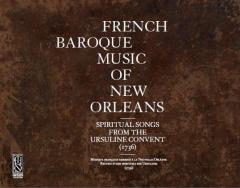
French Baroque Music of New Orleans
Spiritual Songs from the Ursuline Convent (1736)
with essays in English by Jennifer Gipson, Andrew Justice, Alfred E. Lemmon, and Mark McKnight
and in French by Jean Duron
The Historic New Orleans Collection 2014
softcover • 10½" × 8¼" • 284 pp.
full-color facsimile
ISBN 978-0-917860-65-2
ISMN 979-0-800031-00-7
The oldest known musical document in Louisiana history is now available to music and history lovers worldwide, thanks to the release of The Historic New Orleans Collection’s French Baroque Music of New Orleans: Spiritual Songs from the Ursuline Convent (1736). The book features a full-color facsimile of an 18th-century illustrated collection of songs, which the Ursuline convent received in 1754 and has never before been published.
The Ursuline Sisters were the first Catholic nuns to arrive in the New World and were among the earliest European settlers of Louisiana. Their mission included educating young women, many of them the daughters of French colonists.
The songs, called contrafacta, could be considered baroque versions of remixes: poets took popular tunes by leading composers, such as Jean-Baptiste Lully and François Couperin, and changed the lyrics from secular to sacred. Women and the Catholic faithful were the intended audience for these compositions, the idea being that devotional texts would allow them to enjoy the pleasures of current music without compromising their virtue.
“This document provides an unprecedented look behind the walls of the Ursuline convent and school,” said Molly Reid, project editor for the book. “These women and girls, far from home in a new environment, were able to enjoy the pleasures of popular music and the connection to their homeland because of these songs.”
Accompanied by five scholarly essays—including four in English and one in French—French Baroque Music of New Orleans offers a rare look at New Orleans’s earliest days and culture. “This treasured collection, preserved for more than 250 years, offers a direct line to colonial Louisiana,” said Priscilla Lawrence, executive director of The Collection. “We are proud to make it available as a book and score to researchers and musicians around the world.”

